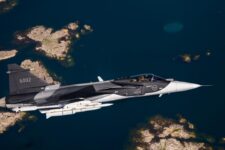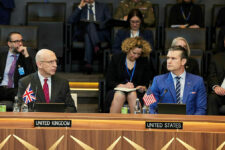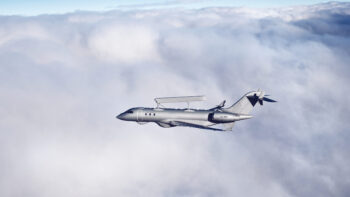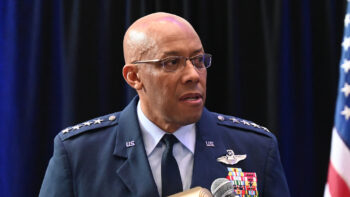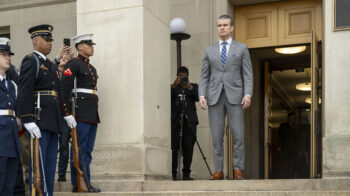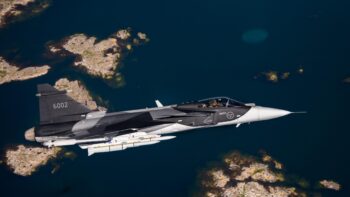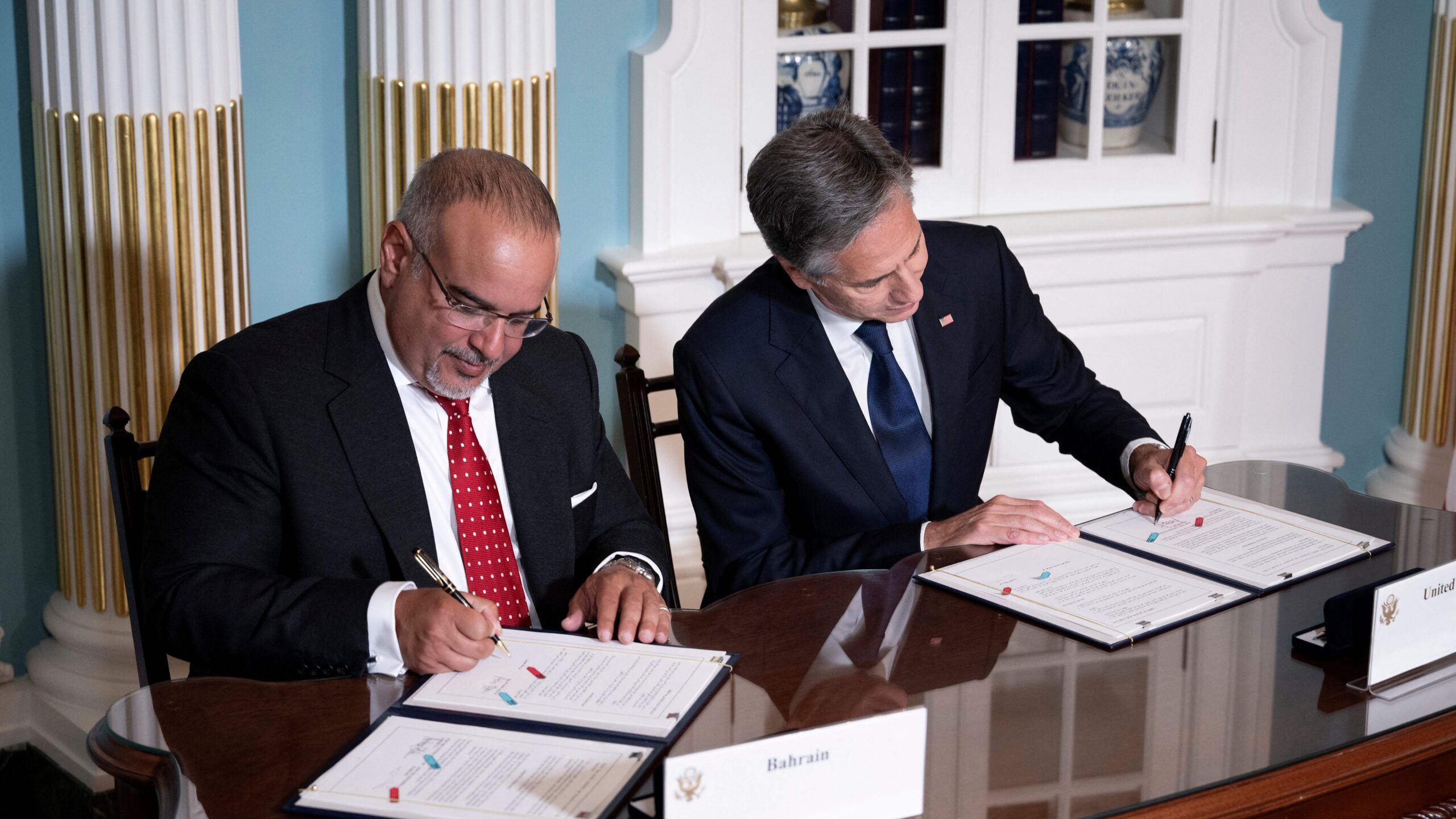
Bahrain’s Prime Minister and Crown Prince Salman bin Hamad al-Khalifa and US Secretary of State Antony Blinken sign a security integration and prosperity agreement at the US Department of State on September 13, 2023, in Washington, DC. (Photo by Brendan Smialowski / AFP) (Photo by BRENDAN SMIALOWSKI/AFP via Getty Images)
BEIRUT — Bahraini Prime Minister Salman bin Hamad Al Khalifa will visit the Pentagon today, a day after signing a brand new security and economic arrangement with the US — one that analysts say appears to represent more of a symbolic gesture than any significant change in the security landscape of the Gulf, for now.
On Wednesday US Secretary of State Antony Blinken and Al Khalifa signed the Comprehensive Security Integration and Prosperity Agreement (C-SIPA), a “new framework to promote cooperation across a range of areas, from defense and security to science, technology and trade,” according to the White House.
Specifically for defense, the arrangement aims to enhance deterrence “including through expanded defense and security cooperation, interoperability, and mutual intelligence capacity building” and to “help formalize steps being taken by US Central Command to integrate the region’s air and missile defense systems and increase maritime domain awareness, among other initiatives.”
A senior administration official told reporters C-SIPA is an “internationally binding” agreement that establishes a “policy” where “both of us to work together to help deter and confront any external aggression against the territorial integrity of any of the parties,” but did not elaborate on precisely what that meant. The Pentagon, the official said, “had a big role in forging this arrangement.”
But while the official described C-SIPA as a “very strong arrangement” that signified a “really significant upgrade” in US-Bahrain relations, analysts told Breaking Defense that based on what information is public, its real value may not lie in relatively meager changes in defense, but in the message it sends to other regional powers, and where C-SIPA might be replicated.
“Bahrain is already in the top tier of US partners. It has major non-NATO ally status, and has a free trade agreement with the US. These are the gold standards for partner nations,” said David Des Roches, associate professor at the Near East South Asia Center for Security Studies, told Breaking Defense after Axios reported the outlines of the deal earlier this week.
Des Roches highlighted that Bahrain has long been a favored destination for excess US military equipment and is regarded as a steady, well-governed partner in a key strategic region. The US Navy’s Fifth Fleet is based in Bahrain, and the small Gulf country has been a hub for drills with regional and international players, including recent unmanned surface vessels testing.
The country “will continue to play an outsized role in US policy in the region,” security pact or no, he said.
Des Roches said that Bahrain probably wanted “a formal security treaty [that] binds the US to its defense,” but he doubted the US would agree to that any time soon.
Beyond the global security implications, a formal treaty would be much more cumbersome domestically for the Biden administration, as it would require congressional approval, Des Roches noted. (The senior official confirmed C-SIPA does not require congressional approval, only notification.)
Andreas Krieg, senior lecturer at King’s College London, agreed that a formal defense treaty is likely out of the question.
“While the US will still want to lead from behind [in the Gulf], rather than on the forefront, Washington doesn’t want to make its commitments firmer,” Krieg told Breaking Defense.
Though Krieg cautioned not to expect much from any security pact, he did say that such a lower-tier security and economic arrangement could still prove valuable as a blueprint for tightening defense ties with other regional players at a critical moment.
“I think the US is playing a dual strategy in the Gulf at the moment: One is of a potential outreach towards Iran to create a back channel potential mostly via Qatar to build a potential nuclear deal, and boosting defenses and security of the Arab Gulf states to undermine the security concerns that exist across the [Gulf Cooperation Council],” said Krieg.
Kreig said the agreement could send a message to other Gulf states that the US is a reliable partner in the region as China, for instance, attempts to make inroads.
RELATED: China, UAE to hold first-ever joint military drill, likely a ‘message’ to US, analysts say
Des Roches said even after Saudi Arabia’s latest rapprochement with Iran, Tehran’s threat to Gulf nations hasn’t much diminished, which makes defense agreements with the West still relevant.
“This declaration will have little policy import, but will be significant as a statement of support to a small country which is continuously threatened by Iran’s imperial ambitions,” he said.
The White House appears to agree that such an arrangement could be repeated elsewhere, referring to C-SIPA as a “cornerstone for broader grouping of countries over time that share our vision… for a more prosperous, more integrated, more peaceful, more stable Middle East region.”
The new arrangement could have its benefits for the US, Kreig said, as he expected the US to expand the presence of the Fifth Fleet in the Gulf and work through variety of different unmanned platforms to enhance the monitoring ability of the waterways and the maritime choke points.
“The US wants the Fifth Fleet to expand its presence and deterrence posture and to engage with other navies of the GCC countries rather than bearing the burden of regional maritime security alone,” he added.
Bahrain expects to receive the first batch of F-16 Block 70 in the first half of 2024, making the Gulf country the first operator of this version of F-16. The senior official said the new arrangement does not include any additional weapons sales specifically.
“So, we have a very close military relationship with Bahrain,” the official said. “That’s going to continue. And I think this agreement kind of formalizes that.”
Saab CEO floats Euro defense ‘coalition,’ plans to fly unmanned combat demonstrator
“We should sort of understand that we need to do more in Europe, nation by nation, of course, but also as part of the alliance, being a strong pillar in NATO” said Saab CEO Micael Johansson.






